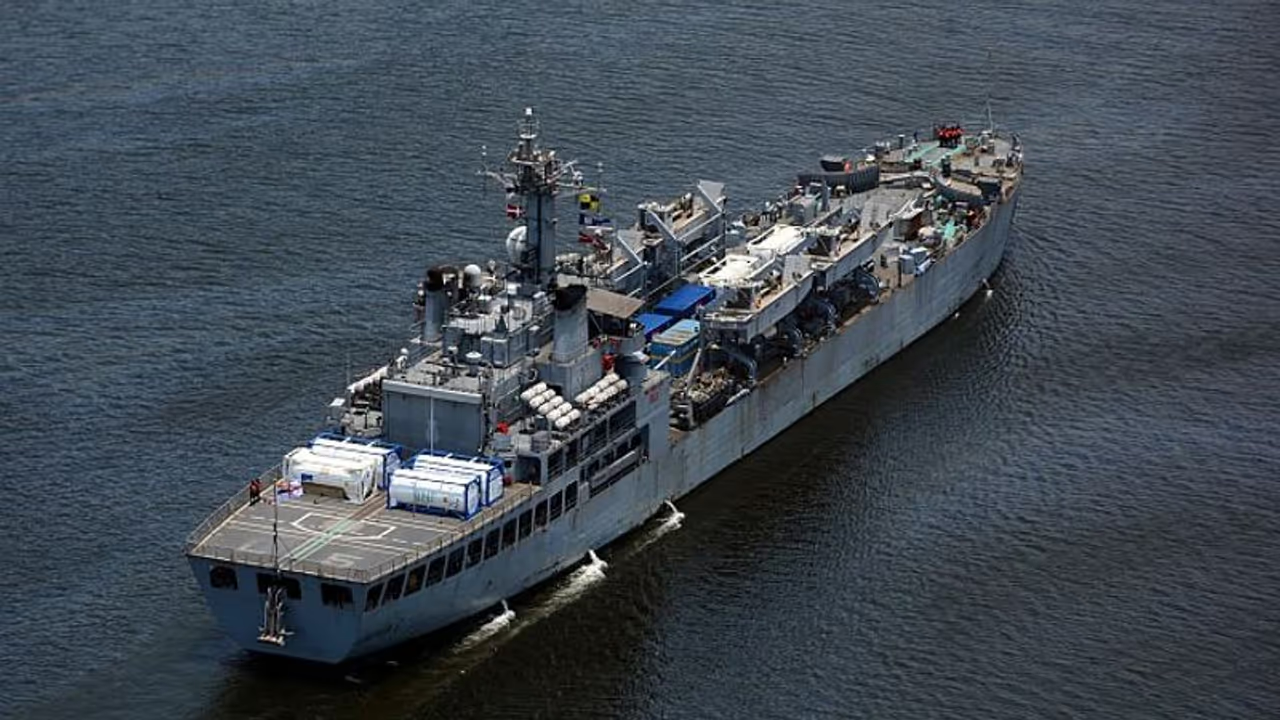Operation Samudra Setu 2 was another example of how the Indian Navy rises to the occasion and helps the country overcome any challenge.
The Indian Navy has earned the nickname 'silent service' as most of its contributions to securing the nation happen at sea, far from the public eye.

Over the last two months, the Navy has been undertaking Operation Samudra Setu 2 to help in the national effort to overcome the second COVID wave.
This unprecedented national crisis necessitated innovation and improvisation to arrive at solutions far outside the recognised 'normal'.
True to its nature, the Indian Navy stepped up and delivered.
As the national demand for Medical Oxygen grew, the Indian Navy was called upon to augment the transportation of liquid Medical Oxygen and empty cylinders from various countries in the Indo-Pacific.
Combat-ready warships, which were prepared to take on any challenge at sea, were rapidly deployed to friendly foreign countries across the expanse of the Indian Ocean Region from the Persian Gulf to South East Asia, as part of Operation SamudaSetu-2.
A 'Can do' attitude has always defined the Indian Naval sailor, and this attitude was highlighted once again during the entire operations.
Ten warships, including destroyers, frigates and amphibious ships -- from all three Commands of the Navy -- quickly reached countries in West and South East Asia to pick up containers filled with Liquid Medical Oxygen concentrators, PPE, COVID test kits, ventilators and other medical equipment.
On May 5, INS Talwar reached Mangalore with over 54 MT of liquid oxygen from Bahrain. This was when the Covid situation in Karnataka was challenging, and these supplies played a vital role in saving innumerable lives.
Incidentally, INS Talwar had been at sea when the mission was ordered, as she was deployed in the Western Arabian Sea to provide security to merchant ships against piracy.
The ship was able to immediately adapt to the new requirements and successfully undertake the mission -- a testament to the Navy's inherent flexibility and a firm resolve to deliver -- 'Har Kaam Desh Ke Naam'.
A young sailor on Talwar recounted the perilous days at sea when the ship was racing homewards in rough weather to deliver oxygen. He said, "Even when the ship was rolling, the watch on deck would continuously check and recheck the bindings to make sure nothing broke free. I remember wearing a harness and climbing on the container to check the securing, with strong winds and heavy rolling. It was a challenging task, but because I knew how important it was for our country, I never felt scared."
Over the next few days, four more ships reached Mumbai and New Mangalore with over 250 tons of medical oxygen in 9 containers, nearly 2000 oxygen cylinders, and other medical stores from Qatar and Kuwait.
Each ship discharged the aid and was re-deployed for the next run. Subsequent missions embarked on assistance from Saudi Arabia, Oman and the UAE.
Meanwhile, on the Eastern Seaboard, IN Ships were transporting aid from Brunei, Singapore and Vietnam, which were brought back at best speed to Chennai and Visakhapatnam.
All in all, the ships deployed for Samudra Setu 2 made over 14 voyages, covering nearly 90,000 km to bring back aid essential to the national fight against the pandemic.
The operation, which has spanned over seven weeks, brought home over 1050 tons of liquid medical oxygen and 13,800 oxygen cylinders in addition to other critical medical aid.
Closer home, ships from naval bases at Karwar and Kochi set up an Oxygen Express for the Lakshadweep and Minicoy Islands. Medical aid, including oxygen, was regularly transported to the islands to assist the local population.
No effort was spared to ensure that the local administration continued to receive all necessary supplies, even when the cyclone Tauktae was unleashing its fury in the region.
Each mission was undertaken under the sceptre of the coronavirus, with naval crews sparing no precaution to keep themselves and the aid providers safe.
Some of these men and women even had family members who had contracted the virus, but they continued to discharge their duty, on the high seas, with complete commitment. Such is the strength of the Navy's work ethic that not one of its personnel stepped back from the call of duty, regardless of their personal situations.
The Indian Navy has proudly embraced the moniker 'Silent Service' and continues to deliver for the country no matter what. This operation is another example of how the Navy rises to the occasion and helps the country overcome any challenge.
The 'bridging of the sea' by the Navy, under 'Samudra Setu 2', exemplifies how it can overcome the tyranny of distances to connect India with its regional friends in a meaningful and abiding manner.
The Indian Navy has already re-deployed all ships involved in the operation for regular missions and taken guard for the next mission.
Silently, as always, the men and women of the Navy continue to give their best, knowing that they did good work and saved lives -- all in service of the nation.
